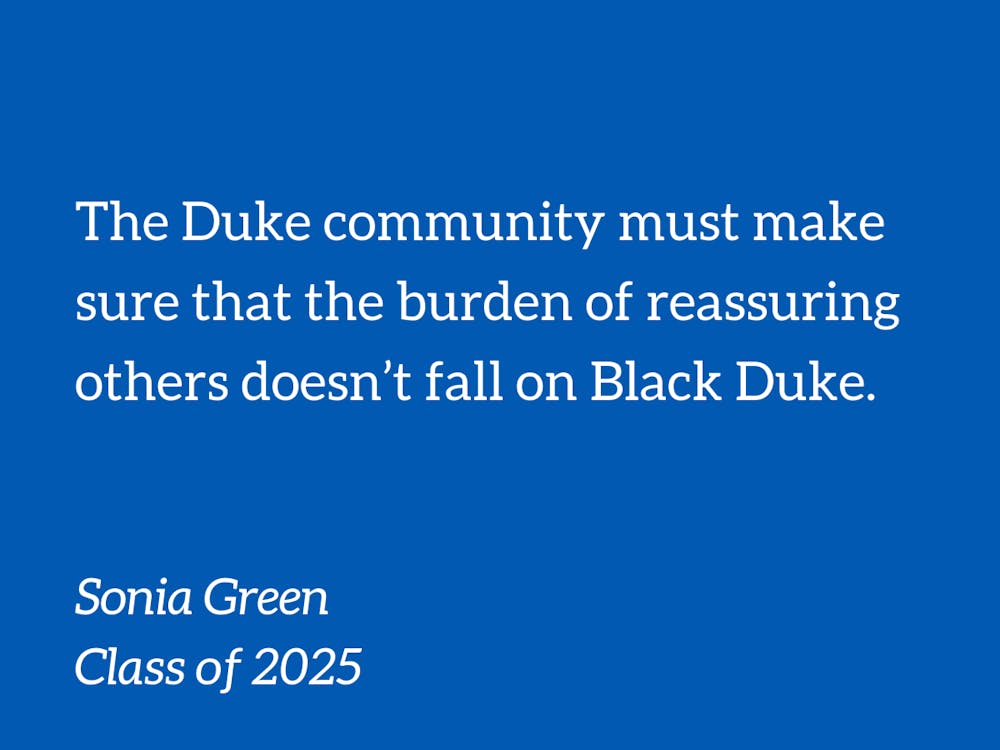On Tuesday, September 27, Duke students received an email about a robbery that occurred near the Center for Documentary Studies. The suspect was described as “male, medium-dark skin tone, late ’20s, dreadlocks with a black bandana, black hoodie and blue jeans”. Initially, I felt sympathy for this “victim”, whom I assumed was robbed of some electronic devices, until I received another email a few hours later that said no robbery or theft occurred at all. This student, I learned, reported the theft of a car—something much more valuable and difficult to steal than a MacBook or iPhone—went to great lengths to describe the young Black man who allegedly stole it and preyed on the fear of Durham that many students on campus still hold (a fear that is quite frankly amusing considering how removed Duke is from the Durham community). Then they made a conscious choice to weaponize the inherent fear of Black men that our society holds close.
As an African & African American studies major who is currently taking a course that examines these exact issues, I feel like I must say something. First and foremost, I’ll clarify that whether or not this student lied about the robbery/theft is not the problem, or at least, it’s not our problem. The problem is that this person went to great lengths to give an in-depth description of the age, skin tone, hairstyle, and clothing of this “alleged suspect”. When fabricating this fictional criminal, why wasn’t he made to have fair skin, blond hair and blue eyes? Why did he have dreadlocks, a Black hairstyle that is already associated with negative stereotypes? Why was it a young man with “medium-dark skin”? Why was he wearing a hoodie and a bandana? Everything from this man’s age, to his dark skin, dreadlocks, bandana and black hoodie that seems to instill fear in even the most liberal communities is a perfect example of the stereotype that Black men cannot seem to escape. The only thing that was missing from this narrative is the (perceived) weapon that would have then made the victim (and police) fear for their lives. If this “suspect” had been armed or perceived to have been armed, things would be even worse.
My question is not why this student lied or why they chose a Black man to be the antagonist in this story. Too often, conversations like these ask the wrong questions and allow people to ignore the uncomfortable ones. My question focuses on those who will inevitably bear the repercussions of this student’s selfish actions. What do Black men on campus fear now? Do Black male students on campus with dreadlocks and dark skin fear being seen in this same light? Have they been forced into this category before by peers, the Duke University Police Department (DUPD), or other officers in Durham? How do Black male staff members feel when they walk onto campus every morning and leave after dark to return home? Are they fearful at all, or are they bracing themselves for those students who refuse to acknowledge their humanity and personhood? I wear my royal blue hoodie when I’m cold, never with the hood on, of course, but do Black men on campus fear being stereotyped for wearing theirs? Do they even have the privilege of being able to wear an extra layer of clothing when they are cold without being judged?
So much of this conversation focuses on this student and why they lied about being robbed by a Black man. I want to know what this means for Black male students, faculty, staff and visitors moving forward. And for those of us in the Black community who aren’t men, we are situated in a position where we can see the harm that these stereotypes cause, but are unable to stop what happens afterward. The Duke community must make sure that the burden of reassuring others doesn’t fall on Black Duke. We are not the problem, and we do not exist to make others feel safer. This time, it’s your turn to show us that you see our humanity. Whether we wear hoodies, bandanas and dreadlocks or suits, blazers and trousers, know that we are people before anything else.
Sonia Green is a Trinity second-year. Her column typically runs on alternate Wednesdays.
Get The Chronicle straight to your inbox
Signup for our weekly newsletter. Cancel at any time.

